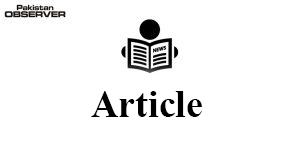Jamshaid Mohsin
THE ongoing arguments about roles of politicians and establishment or bureaucracy, have raised many doubts and misgivings in mind of public, which needs to be addressed or reconciled. Present form of democracy has been under criticism for bringing up incapable leaders on the basis of nothing but, wealth, inherited legacy, sometimes provoking racial or religious chauvinism to allure voters. The public gets disappointed and this situation gets them trapped into even worse situation. For the last couple of years, a buzzword of Presidential Form is being propagated, in a way government by technocrats. Now, this form, closer to Aristocracy (Socrates), has its own demerits in which another class of bureaucrats dominate without motivation and realization of the problems of ordinary public, for instance, problems lower and middle class and the businessmen, because they are not in touch with public. Moreover, proponents of democracy argue in defence that the politicians are answerable to public every five years and inefficient are replaced while bureaucrats are permanent and cannot be replaced due to inefficiency, has to be tolerated howsoever, secondly, there is relatively more liberty of expression during democracy. So there are pros and cons in each system which need to be reconciled to evolve an improved form of selecting leadership.
The West, which claims to be advanced society, democracy is in restrained form. In USA, which claims to be a free country, there is mutated democracy, in the sense that there are only two parties: Democrats and Conservatives, and mostly elite class is brought up through these parties. In the UK, too, there are three major dominating parties, Liberal, Labour & Conservative. The issue is, how to evolve a system which rectifies the demerits and augment the merits of democracy. Plato, in his book, The Republic, had envisaged these conflicts in 375 BC, although there is a perception that Socrates, Plato’s teacher, had originally given these ideas and Plato just reduced Socrates ideas into written form. However, Plato propounded five ways of organizing a government, and had preferred the aristocracy out of these alternatives, while describing democracy as worst form, although I don’t agree with his later assertion. In Aristocracy, Plato asserted on leader’s eligibility based on level of knowledge and wisdom. He proposed that every position should be assigned according to educational ability and aptitude. In his words, a leader should have spirit of Gold, had achieved highest level of intellectuality, self-control and wisdom, through step-wise process of rigorous training.
The Islamic Holy Book, Quran too, had given basic principles of leadership, as highly intellectual, wise and having capacity to perform, irrespective of his status or wealth, if we interpret, Albaqra-247, wherein Talut was preferred despite he was not descendent of a wealthy family, but his two qualities, i.e. knowledge or wisdom and ability for position, made him suitable for leadership. Former President Musharraf, although he was condemned for most of his ventures, yet one of his initiatives was very apt and appreciable, he tried to bring educated and capable parliamentarians by sanctioning graduation as basic eligibility to contest for parliamentary position. This development towards educated parliament was later abrogated by traditional politicians. To sustain as respectable nation in highly competitive global political environment, we need to take following measures so that country makes real progress by ensuring that relevant professional people are managing country’s departments. A democracy with qualities of aristocracy will be installed, realizing the Socrates ideology. 1. Requirement of graduation for a parliamentarian should be reinstated. 2. A political party should submit educational qualifications of its candidates and publish on websites and those who are candidates for portfolios of ministries and divisions as ministers or advisors should have higher level of professional education in that field. Such criteria can be developed for each position.
For example, a candidate for Economic Affairs Ministry should be, PhD Economics, Minsters for Planning or Finance should be CA, CMA, PhD Finance etc. Candidate for Law Minister should be LLM or Bar-at-Law, for Health should be FRCS or Qualified in Preventive and Public Health Care, for urban development should be Civil Engineer, and so on. 3. The candidates should go through basic training course of assembly procedures, course may contain Basics Political Science Theories, Constitution, Rules of Business, General Financial Rules and Budgeting Process, Bye-laws of major departments, like Planning, Finance. These measures would ensure that in future any parliament or ruling party elected has a capacity to serve not just fooling public with passionate slogans and sets and achieves realistic objectives.
—A freelance journalist, based in Islamabad










